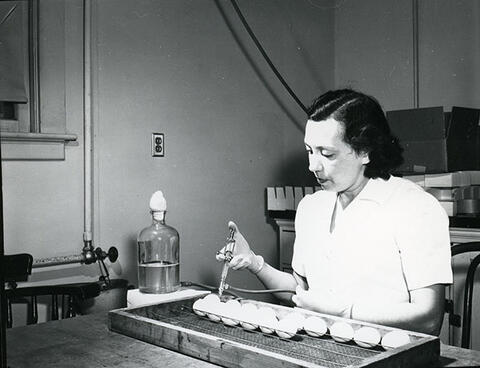
Zone du titre et de la mention de responsabilité
Titre propre
Mamie C. Janzen - Encephalomyelitis Research
Dénomination générale des documents
- Document graphique
Titre parallèle
Compléments du titre
Mentions de responsabilité du titre
Notes du titre
Niveau de description
Pièce
Cote
Zone de l'édition
Mention d'édition
Mentions de responsabilité relatives à l'édition
Zone des précisions relatives à la catégorie de documents
Mention d'échelle (cartographique)
Mention de projection (cartographique)
Mention des coordonnées (cartographiques)
Mention d'échelle (architecturale)
Juridiction responsable et dénomination (philatélique)
Zone des dates de production
Date(s)
-
Apr. 1948 (Production)
Zone de description matérielle
Description matérielle
1 photograph : b&w ; 12.5 x 15.5 cm
Zone de la collection
Titre propre de la collection
Titres parallèles de la collection
Compléments du titre de la collection
Mention de responsabilité relative à la collection
Numérotation à l'intérieur de la collection
Note sur la collection
Zone de la description archivistique
Nom du producteur
Historique de la conservation
Portée et contenu
Mamie C. Janzen, laboratory technician, injects rows of eggs with a syringe.
Bio/Historical Note from news clipping:: “Part of the technique of producing vaccine for encephalomyelitis or “sleeping sickness” in horses is shown here. Dr. Althea N. Burton (second from left), veterinary surgeon at the university’s animal diseases laboratory (see A-3642), is transferring a deadly virus obtained from the brain of a dead guinea pig to that of a live one. The animal’s skull has been anaesthetized and it feels no pain, and will die within four days. Laboratory technicians like I. Wynn (at Dr. Burton’s left) and H. Rublee (right), will remove the brain and place it in a glycerine preservative, keeping it there for a maximum of two weeks. The brain is then ground up and placed in a solution which is injected into an 11-day chicken embryo. Mamie C. Janzen, is shown in this operation at far right. The egg shell is sealed with wax and incubated a further 24 hours, the length of time for the virus to kill the embryo. Removed from the shell and ground up in a “colloid mill”, formalin is added to the embryo to kill the virus. The vaccine is then filtered, diluted in saline solution, and stored for two weeks to ensure the death of the entire virus. In this form it is bottled and shipped to prairie druggist[s] from whom farmers buy it and inoculate their horses at a total cost of $1 per horse.” From Saskatoon Star-Phoenix, Apr. 1948.
Bio/Historical Note: Mamie Clara Janzen was born in 1904 in Rosthern, Saskatchewan. She took her schooling in Rosthern and moved to Saskatoon with her family in 1924. Janzen joined the staff of the Virus Laboratory in 1939 as a laboratory technician. She was part of the team that developed the cure for equine encephalomyelitis, more commonly known as "sleeping sickness." Janzen retired in 1966 due to severe asthma. She died in 1999 in Saskatoon at age 94.
Zone des notes
État de conservation
Source immédiate d'acquisition
Classement
Langue des documents
Écriture des documents
Localisation des originaux
Disponibilité d'autres formats
Restrictions d'accès
Délais d'utilisation, de reproduction et de publication
Photographer: Unknown
Copyright holder: Unknown
Other terms: Responsibility regarding questions of copyright that may arise in the use of any images is assumed by the researcher.
Instruments de recherche
Éléments associés
Accruals
Note générale
See A-3642 for first image of two in a series.

